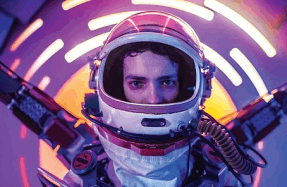Seeing Double CINEMATIC TWINS IN RABBIT AND THAT’S NOT ME


Jacques Lacan’s notion of the ‘mirror stage’ embodies a powerful intersection of psychoanalysis and film theory; when identical twins are the focal point of a cinematic narrative, the work becomes fertile ground for exploring the subconscious terrain of identity formation.
According to Lacan, the fragile human ego is on an endless quest for reconciliation with the promised illusion of a ‘perfect’ self. The infant first glimpses itself in the mirror and perceives a gloriously unified whole – a being in control of its bodily mechanisms. This contrasts with the fledgling agency of the infant, who is yet to master control of its limbs. Even further away from the child’s grasp is an ability to exert control over the physical and social environment. Lacan called that first interaction with one’s own reflection the ‘ideal ego’. From that moment of initial contact with a romanticised version of ourselves, our unconscious seeks an unattainable state of perfection, and is therefore always dissatisfied.
It seems fitting, then, that the idea of doubling was also taken up by Lacan:
the specular image seems to be
You’re reading a preview, subscribe to read more.
Start your free 30 days





